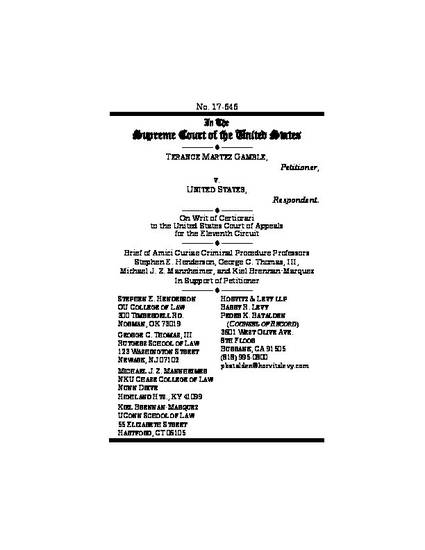
Other
Brief of Amici Curiae Criminal Procedure Professors in Gamble v. United States, No. 17-646
(2018)
Abstract
The Fifth Amendment guarantees that, “No person shall be ... subject for the same offence to be twice put in jeopardy of life or limb.” Yet that is precisely what happened to Terance Martez Gamble. The State of Alabama prosecuted and convicted him for being a felon in possession of a firearm. Subsequently, the United States initiated a second prosecution for what all parties have assumed is definitionally the same offense, yielding a second conviction. That second, duplicative prosecution and conviction violated the letter and spirit of the Double Jeopardy Clause.
As a matter of the Framer’s understanding, as a matter of this Court’s theoretical justifications for double jeopardy, and as a matter of policy respecting multiple prosecutorial powers, the United States should not be considered a double jeopardy sovereign that is completely independent of its constituent States. This Court ought to restore the double jeopardy right to its proper constitutional position, holding that as between the United States and Alabama, there is not—and never should have been—a “dual sovereignty” exception to the double jeopardy bar when identical offenses are prosecuted.
Keywords
- double jeopardy,
- dual sovereign,
- fifth amendment
Disciplines
Publication Date
2018
Citation Information
Stephen E Henderson, George C. Thomas, Michael J.Z. Mannheimer and Kiel Brennan-Marquez. "Brief of Amici Curiae Criminal Procedure Professors in Gamble v. United States, No. 17-646" (2018) Available at: http://works.bepress.com/stephen_henderson/61/
